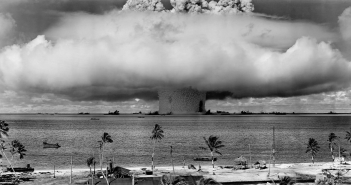On April 28th Fintan O’Toole brought a telling revelation to light in an article entitled, ‘Government ditched its own plan during this crisis’. He claimed that ‘Within the nexus of experts engaged in the management of the crisis, there are increasing concerns about the systems part of the operation’
He then revealed that:
the Government has a very well thought through system for managing emergencies – but it more or less completely ignores it … There are reasons why the Government missed the huge part of the crisis that was unfolding in nursing homes and residential institutions. One of them is the tunnel-vision that results from a top-down, command-and-control approach that is utterly at odds with what is supposed to be State policy
O’Toole refers to a 60-page document called ‘Strategic Emergency Management: National Structures and Frameworks’, which specifically envisages ‘the potential widespread spread of a pandemic’.
When Covid-19 cases began to multiply, however, ‘it was shoved in a drawer.’ ‘Power instead was taken over by the Taoiseach’s department and information was fed into it, primarily by a single body of experts, the National Public Health Emergency Team [NPHET]’, which ‘lacked voices from the nursing home sector.’
The mistakes that were made at the height of the pandemic in March/April, when sick patients were returned to care homes may be traced to defective leadership structures, but at this stage there is little value in pointing the finger of blame, as we may assume that individuals were acting to the best of their abilities under enormous pressure, as epidemiological assessments were projecting a far worse death toll than was ultimately the case.
But structural problems remain in the organisation. It is high time we re-examined how the government is being advised to bring the population to the promised land of ‘living with the virus.’ At this stage other forms of advice should be sought. Presumably the government is already receiving significant inputs from the business sector, but other important viewpoints are not part of the conversation.
Varadkar’s Comments
In what was a stark reversal of the situtation in late April when Dr Tony Holohan when asked about possible easing of restrictions replied, “I haven’t made up my mind,” the now Tánaiste Leo Varadkar identified a growing cleavage in Irish society between the private and public sectors on Claire Byrne Live. He commented that the pay packets of those on NEPHT (and his own) would not be affected by further restrictions and that cabinet would be the ones making any decisions on imposing further restrictions.
'None of those people would have faced being on #PUP, none of them have to tell someone they are losing their job, none of them will have to shutter a business for the last time' – Tánaiste Leo Varadkar on #NPHET #cblive pic.twitter.com/ZAw7sDxGLo
— Claire Byrne Live (@ClaireByrneLive) October 5, 2020
That such a provocative comment, which perhaps only “Dr” Varadkar – whose background as a doctor was generally perceived as advantageous at the height of the crisis – could have been aimed against the doctor-in-chief in NPHET, which although composed primarily of civil servants, rather than doctors or scientists, nonetheless appears to have a higher standing in the eyes of the public than government Ministers.
In fact, it might be expected that an expert grouping would see it as their responsibility to put forward a variety of courses of action as opposed to plumping for one, leaving it to the government to weigh the total implications of the various options.
With case numbers – blunt statistics which have assumed a frightening importance – not reaching the stratospheric levels that some were predicting earlier this week, the government’s gamble to take a less draconian approach, which is more in line with Ireland’s European partners, may just be paying off. Also, Varadkar’s suggestion that the number of hospital admissions, especially requiring ICU, and mortalities, will become the guiding indicators may also signal a change in the way in which State will be contending with the virus in future.
Varadkar’s comments, along with Fintan O’Toole’s earlier insights, may also highlight a broader problem, as to whether a body with the composition of NPHET can, in coping with an emergency, be prone to an element of ‘groupthink,’ such as we have witnessed in the past in controversial situations in Irish public life, notably the Bank Bailout in 2008.
Advisory Groups
HIQA, for its part, established a COVID-19 Expert Advisory Group on September 29th to support an evidence-based response to COVID-19, under the chairmanship of Cillian de Gascun. This includes what appear to be most of the leading scientists in the country, who will have insights on the virus itself.
There is also an EAG Research Subgroup the members of which are:
Prof. Colm Bergin (Co-Chair), Consultant Infectious Diseases, St. James’s Hospital and Professor of Medicine, Trinity College Dublin
Prof.Cliona O’Farrelly (Co-Chair), Professor Comparative Immunology, Biochemistry, Trinity College Dublin
Dr Teresa Maguire, Head of Research Services and Policy Unit, Department of Health
Dr Siobhán O’Sullivan, Chief Bioethics Officer, Department of Health
Dr Mairéad O’Driscoll, Director of Research Strategy and Funding, Health Research Board
Dr Mark Ferguson, Director General, Science Foundation Ireland
Prof.Stephen Kinsella, Associate Professor of Economics, University College Limerick
Prof.Orla Feely Vice President for Research, Innovation and Impact University College Dublin
Prof.Ivan Perry, Professor of Public Health, University College Cork
Dr Ana Terres, Head of Research and Development, HSE
Dr Sarah Gibney Senior Researcher, Research Services and Policy Unit and IGEES, Department of Health (replaced by Peter Doherty, Research Servicesand Policy Unit, Department of Health)
Again this contains a significant number of civil servant administrators and a single individual from a non-scientific discipline, tellingly perhaps, economics.
Guiding Philosophy
It is hardly surprising that the Government has looked to administrators and academic scientists to guide it through this crisis. There must be some concern, however, that apart from economic cleavages between the private and public sector a scientific or technocratic background will not necessarily equip an individual to weigh up choices with profound ethical implications, affecting all strata of an increasingly diverse Irish society.
In contrast in Sweden, where the effectiveness of government messaging in the absence of draconian measures has been roundly praised – even by those critical of an unwillingness to impose a lockdown – philosophers have been advising the government from the outset. Problematic policy choices and ethical dilemmas are faced and addressed.
Notably, the National Board of Health and Welfare, one of Sweden’s main agencies for handling the COVID-19 pandemic brought in philosophers to design guidelines for priority-setting in medical care. The work was led by philosopher Lars Sandman, director of the Centre for Healthcare Priority Setting and a professor of healthcare ethics at Linköping University.
In Sweden we are not allowed to take chronological age into account, but biological age—so the main thrust of the guidelines is how to interpret biological age in this situation—and we interpret it as covering both probability to survive the treatment and life-expectancy in terms of years. Hence, we propose that if doctors and other healthcare providers have to choose between helping patients with the same probability to survive but different life-expectancies, they should choose to help the patient with more years left. In relation to the ethical principles in the platform this is a somewhat new interpretation or clarification that has never been explicitly done before.
These, we may assume, are the kind of ethical choices that NPHET and the medical establishment faced at the height of the pandemic, but behind closed doors. Perhaps a different philosophical approach would be to the fore in Ireland, with greater emphasis on preservation of life as opposed to overall public health. But it would surely have been beneficial for NPHET to have had recourse to the intellectual clarity provided by professional philosophers, and for there to be greater transparency around this decision-making.
The Aosdána
Moreover, as we build towards ‘living with the virus’ it is worth considering other forms of expertise. Harking back to Ancient Ireland we might consider a new role for the Aosdána (áes dána, ‘people of the gift’). These were the skilled men of early Irish society, whose hereditary or demonstrated skills were in law, medicine, history, music, masonry, carpentry, metalwork – but primarily in poetic composition. The recovery of public art in Ireland is not an idle concern. Artists may prove to be healers, as we navigate these choppy waters.
An obvious body to consult already in existence is the Aosdána, an association of artists created in 1981 and supported by the Arts Council of Ireland. The Aosdána could select from its members individuals to represent artistic creation in Ireland, which is essential to nurture during this global crisis.
There has to be a concern that a body constituted such as NPHET is associated with what Iain McGilchrist might describe as ‘left-brained’ thinking, a tendency which is often associated with those heavily specialized in their chosen fields. Indeed, their very expertise may leave them less resourced to offer a broader wisdom enabling us to answer the hard question: yes, but what are we to do in the here and now?




